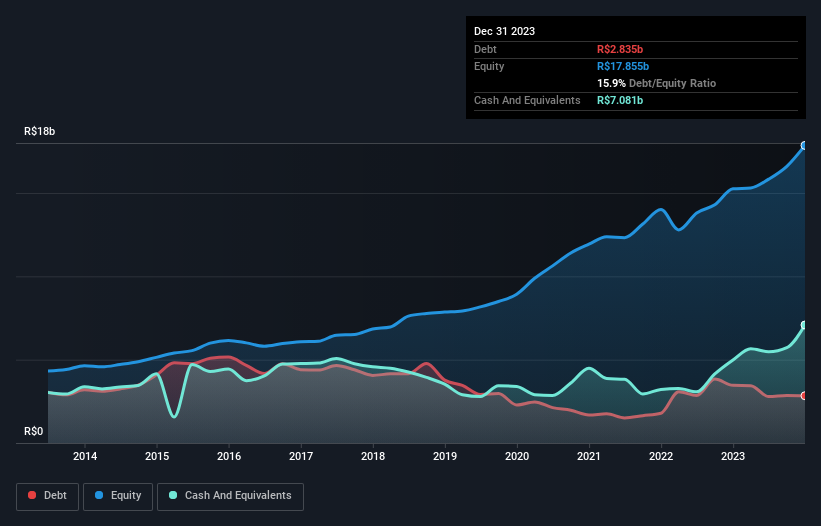Stock Analysis
- Brazil
- /
- Electrical
- /
- BOVESPA:WEGE3
WEG (BVMF:WEGE3) Has A Rock Solid Balance Sheet

David Iben put it well when he said, 'Volatility is not a risk we care about. What we care about is avoiding the permanent loss of capital.' So it might be obvious that you need to consider debt, when you think about how risky any given stock is, because too much debt can sink a company. As with many other companies WEG S.A. (BVMF:WEGE3) makes use of debt. But is this debt a concern to shareholders?
What Risk Does Debt Bring?
Debt is a tool to help businesses grow, but if a business is incapable of paying off its lenders, then it exists at their mercy. If things get really bad, the lenders can take control of the business. However, a more common (but still painful) scenario is that it has to raise new equity capital at a low price, thus permanently diluting shareholders. By replacing dilution, though, debt can be an extremely good tool for businesses that need capital to invest in growth at high rates of return. When we think about a company's use of debt, we first look at cash and debt together.
See our latest analysis for WEG
What Is WEG's Net Debt?
You can click the graphic below for the historical numbers, but it shows that WEG had R$2.84b of debt in December 2023, down from R$3.46b, one year before. But it also has R$7.08b in cash to offset that, meaning it has R$4.25b net cash.

A Look At WEG's Liabilities
According to the last reported balance sheet, WEG had liabilities of R$11.2b due within 12 months, and liabilities of R$2.42b due beyond 12 months. Offsetting this, it had R$7.08b in cash and R$6.61b in receivables that were due within 12 months. So these liquid assets roughly match the total liabilities.
This state of affairs indicates that WEG's balance sheet looks quite solid, as its total liabilities are just about equal to its liquid assets. So it's very unlikely that the R$157.9b company is short on cash, but still worth keeping an eye on the balance sheet. Simply put, the fact that WEG has more cash than debt is arguably a good indication that it can manage its debt safely.
Another good sign is that WEG has been able to increase its EBIT by 30% in twelve months, making it easier to pay down debt. There's no doubt that we learn most about debt from the balance sheet. But it is future earnings, more than anything, that will determine WEG's ability to maintain a healthy balance sheet going forward. So if you're focused on the future you can check out this free report showing analyst profit forecasts.
Finally, a business needs free cash flow to pay off debt; accounting profits just don't cut it. While WEG has net cash on its balance sheet, it's still worth taking a look at its ability to convert earnings before interest and tax (EBIT) to free cash flow, to help us understand how quickly it is building (or eroding) that cash balance. Looking at the most recent three years, WEG recorded free cash flow of 48% of its EBIT, which is weaker than we'd expect. That weak cash conversion makes it more difficult to handle indebtedness.
Summing Up
While we empathize with investors who find debt concerning, you should keep in mind that WEG has net cash of R$4.25b, as well as more liquid assets than liabilities. And it impressed us with its EBIT growth of 30% over the last year. So is WEG's debt a risk? It doesn't seem so to us. Over time, share prices tend to follow earnings per share, so if you're interested in WEG, you may well want to click here to check an interactive graph of its earnings per share history.
At the end of the day, it's often better to focus on companies that are free from net debt. You can access our special list of such companies (all with a track record of profit growth). It's free.
Valuation is complex, but we're helping make it simple.
Find out whether WEG is potentially over or undervalued by checking out our comprehensive analysis, which includes fair value estimates, risks and warnings, dividends, insider transactions and financial health.
View the Free AnalysisHave feedback on this article? Concerned about the content? Get in touch with us directly. Alternatively, email editorial-team (at) simplywallst.com.
This article by Simply Wall St is general in nature. We provide commentary based on historical data and analyst forecasts only using an unbiased methodology and our articles are not intended to be financial advice. It does not constitute a recommendation to buy or sell any stock, and does not take account of your objectives, or your financial situation. We aim to bring you long-term focused analysis driven by fundamental data. Note that our analysis may not factor in the latest price-sensitive company announcements or qualitative material. Simply Wall St has no position in any stocks mentioned.

Simply Wall St
About BOVESPA:WEGE3
WEG
WEG S.A. engages in the production and sale of capital goods in Brazil and internationally.
Outstanding track record with flawless balance sheet and pays a dividend.
